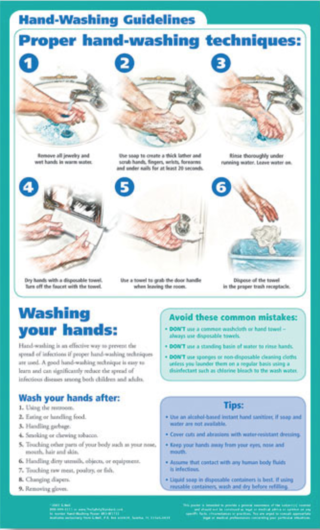OCD
COVID-19 Precautions May Have Triggered OCD Symptoms
Protective measures against COVID-19 can mirror and spike obsessive behaviors.
Posted November 23, 2021 Reviewed by Michelle Quirk
Key points
- Researchers have found protective behavior during COVID-19 has triggered a spike in OCD symptoms.
- Recommended COVID-19-prevention steps, such as disinfecting surfaces, can fall within categories of fear and obsession listed as symptoms of OCD.
- Health professionals recommend setting limits to hand-washing to avoid an increase in compulsive behavior.

The onset of the COVID-19 pandemic seemed to trigger obsessive behaviors in people I knew — and in myself as well. I carried disinfectants everywhere and squeezed some on my hands whenever I touched anything outside my house. I disinfected surfaces inside — whatever others might touch. When I brought food home I let it sit on the porch for three days or, if it had to be refrigerated, washed or disinfected it first. I wore two masks at once. If someone on the street wasn't wearing a mask, I'd cross to the other side; if someone sneezed, I panicked.
Did I and those like me become "obsessive" or "compulsive" or were we already prone to a syndrome that pandemic-related fears allowed to bloom? Or were such behaviors temporary and even rational in the face of a potentially fatal illness that no one, at the outset at least, knew much about?
OCD Symptoms
The symptoms of obsessive-compulsive disorder (OCD) are well known. They include obsessive fear of contamination, often marked by constant hand-washing; irrational fear of uncertainty, of losing control, and of unwanted thoughts; and an unusual need for order and symmetry. Compulsive behaviors include excessive checking of items that might cause harm—for example, checking doors to see if they're locked or checking stoves to see if they are lit. Other symptoms include reordering objects in the immediate environment and hewing to overly rigorous routines and patterns in daily life.
Recommended Infection-Prevention Steps
It is intuitively clear how behavior aimed at preventing infection by the virus can overlay and mesh with these OCD symptoms. Of the 10 steps to avoid infection counseled by the Service Employees International Union and the Centers for Disease Control and Prevention (CDC), at least four—frequent and thorough hand-washing, trying not to share household objects with anyone, disinfecting surfaces, and trying not to touch eyes, nose, mouth—can fall within general categories of fear and obsession listed as symptoms of obsessive–compulsive disorder.
Margo Thienemann, a professor at Stanford University's Department of Psychiatry and Behavioral Sciences, said in an interview that OCD patients have made such statements as, "Now you understand what it is like for someone with OCD to have to keep such close track of what was touched...and when...I have been living like this for a long time and am expert at it...you are having to learn what it is like."
But an OCD patient's familiarity with, say, frequent hand-washing behavior apparently doesn't breed any easing of such symptoms. In fact, according to an article in the Journal of Anxiety Disorders, the rigors of COVID-19 protocols might well have triggered an increase in the severity of OCD: a survey of almost 400 OCD sufferers carried out during the pandemic by German researchers found that "72 percent of the participants reported an increase in OCD. This increase was significantly stronger in (hand-)washers compared to non-washers."
The International OCD Foundation recommends basic precautions for preventing a spike in OCD symptoms during the pandemic. They include setting up a basic safety plan solidly based on recommendations of respected bodies such as the CDC or the World Health Organization, limiting hand-washing to 20 seconds, and restricting disinfection of domestic surfaces to once a day for three minutes at most.
So, to come back to the question posed at the beginning of this post, did the pandemic trigger in me, and others like me, the symptoms of OCD? I cannot say for sure, but thinking about the issue did allow me to reflect on the nature of obsessive-compulsive behavior and my own tendency toward overly obsessive focus—which, in its OCD manifestation, may be linked to increased activity in a neural pathway known as the frontostriatal area of the brain—the same area activated by a different focus-oriented behavior known as ADHD.


